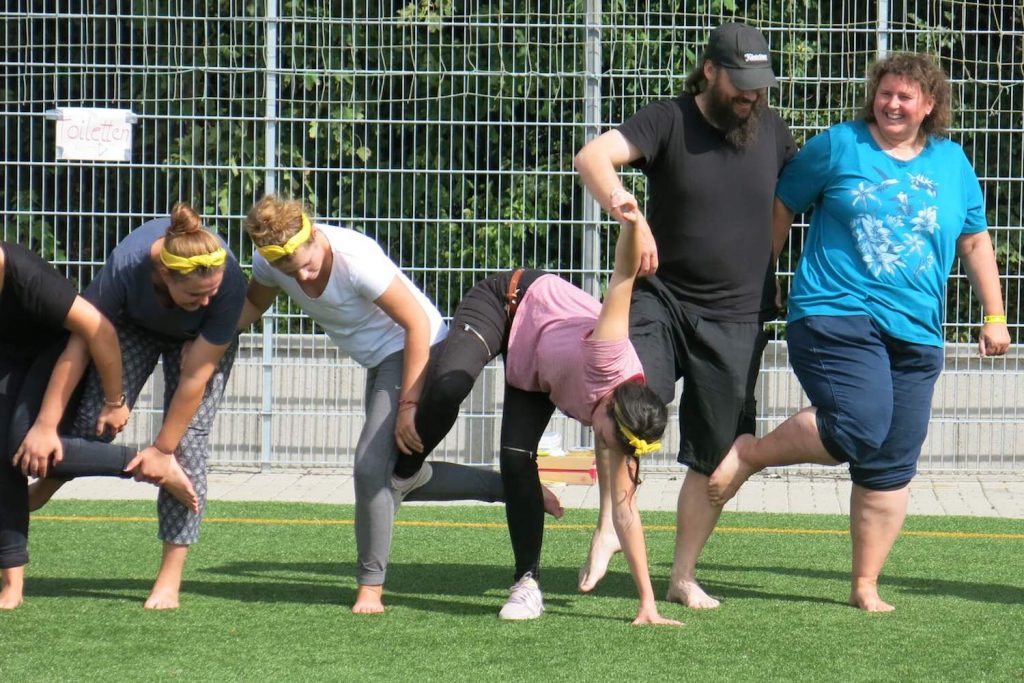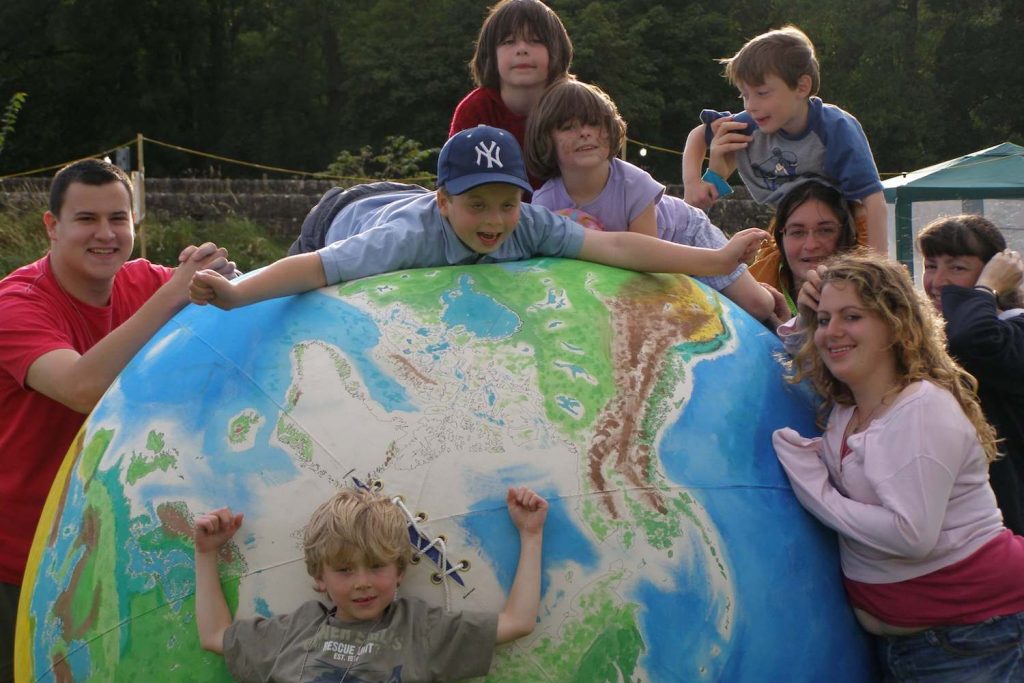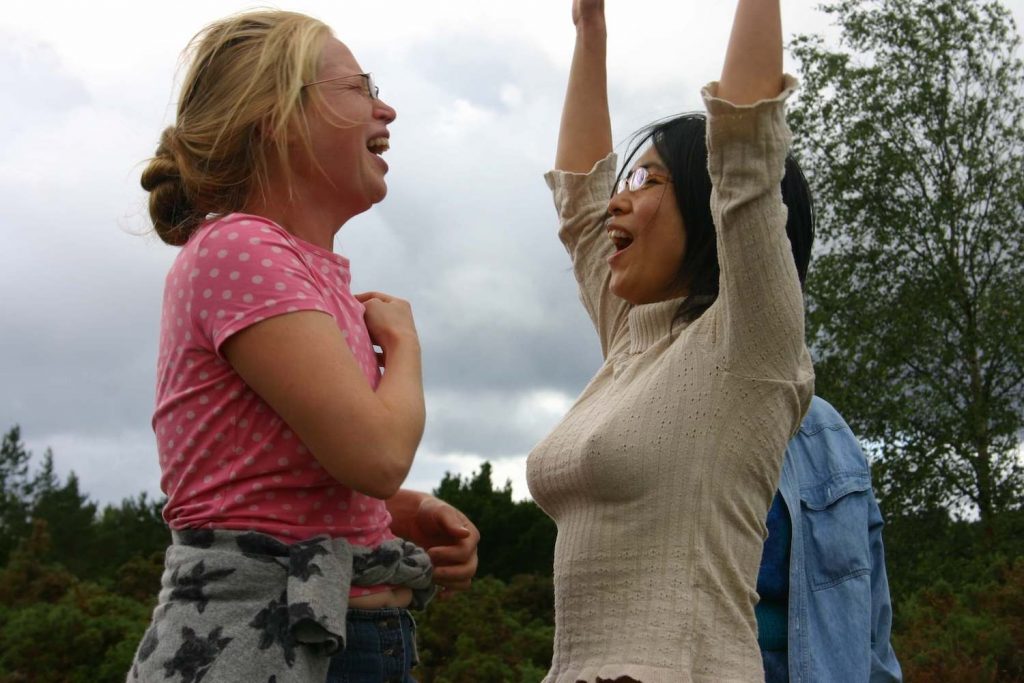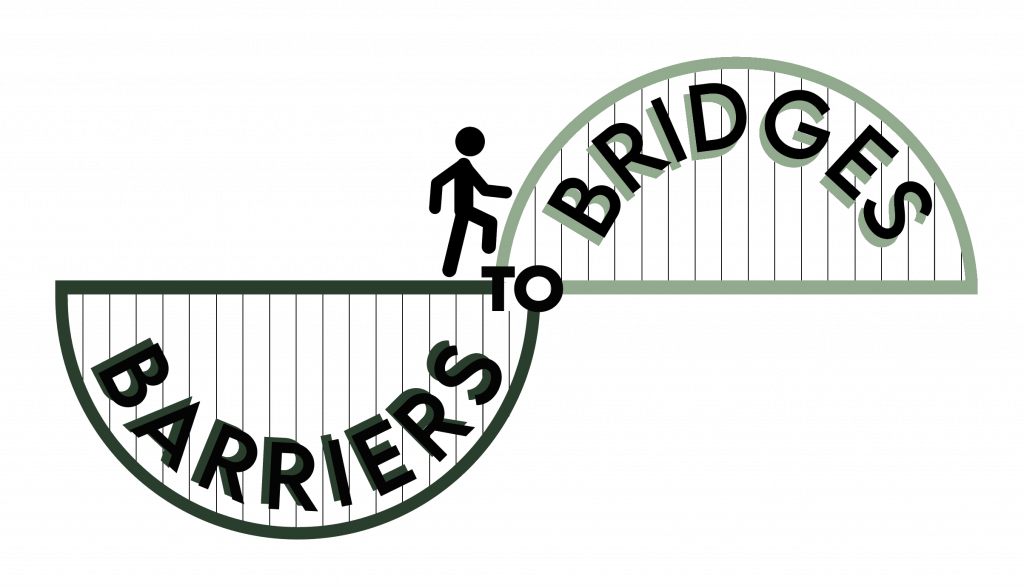by Dawn M. Sanders
Cooperative play through new games brings people from everywhere, all cultures, ethnicities, levels of challenge and political strains, together for the commonality of human connection.

“My whole interest is, ‘I love to play’ it’s a dream come true.” Dale Le Fevre. “We’ve lost the art of doing simple things, everybody wants something complicated… Some great goal… It’s so simple. Just drop the thoughts and just be terribly simple…” Michael Barnett (extracted within The Spirit of Play, Dale Le Fevre)
In late 1974, Dale Le Fevre, now 74, a part-time community radio presenter in Sheffield, had a secure job and was happy enough living on the east coast of the U.S, but had dreams of heading West. A psychic predicted it would happen, but at the time he put limited hopes into the prophecy. Unexpectedly fired from his job, one day while watching a TV programme called Make A Wish, which showed a clip of people playing freestyle in a way he had never seen before – he was inspired and said: “that’s what I wanna do.”
It turned out that the New Games Foundation, a non-profit educational organisation, was in San Francisco, so he headed west along with his dream. It was only a two-week volunteer training programme, but he describes the foundation working as family and he soon carved his path to directing play workshops, by helping to organise an upcoming festival.
Exciting Beginnings
A whole world and playing field of opportunities and magical meetings opened up for Dale, such as Stewart Brand, founder of the new games or Ken Kesey, author of ‘One Flew Over the Cuckoo’s Nest’ (1975 film).

In his book, The Spirit of Play (ISBN: 9781844099498, 2012) Dale says: “I’ve presented New Games all over the U.S., in Canada, every major country in Western Europe, Greece, Poland, Israel, Egypt, South Africa, India, Japan, Australia and New Zealand.”
Breaking Cultural Barriers
Like other universal art forms, such as music, Dale says: “Cooperative games create a universal language with which people can relate to each other. Players of all languages seem to enjoy New Games, even when the players don’t speak each other’s language. People in various cultures I’ve been exposed to respond similarly to the games.”
He describes Scots as friendly and chatty, but feeling awkward to touch, whereas in Mediterranean and Indian cultures, men would hug while women walk arm-in-arm but touching someone of the opposite sex was taboo. Yet, he has devised a step-by-step process to relax cultural boundaries or expectations, so by the end of the games, people can relax within a safe space out of the public eye.
The book reminisces how, leading a games session in Israel was especially challenging, as, not only Jews and Arabs would mix, but Jews from various diasporas throughout the world, were culturally nuanced. Chaos, at first was the name of the game, while everyone clambered for attention at once and Dale needed to get the attention of the lot: “I intuitively started flailing my arms and legs in the air and screeching like a maniacal monkey. It worked. (“Crazy” people are given attention all over the world since nobody knows quite what to expect.) As soon as I had everyone’s attention, I started to introduce a game.”
Catholics and Protestants in Northern Ireland during ‘the troubles’ were brought together, as were blacks, whites and mixed-raced people in South Africa during apartheid.
Cooperation = no winners or losers
Apart from the direct physical interaction of cooperative games, collectives such as TESA (the toolkit for Education and social action) resonate the wider conceptual ideas of cooperative play.
TESA brings about ways of addressing social inequalities, local economies and community cohesion, through role play or examples of teamwork. The fierce competitiveness and individualism of capitalism is realised by participants and introduces possible budding business models from particularly disadvantaged groups. TESA designs board games, such as co-opoly, card games or apps as tools for cooperative play.
Within the predominant games of sports, business or politics, the desired end result is often finite. The Spirit of Play, emphasises the two types of game: “The rules of a finite game may not change: the rules of an infinite game must change. Finite players play within boundaries: infinite players play with boundaries.” James P. Carse.
Dale writes how competitiveness can be healthy, as after all, humans are competitive beings. Yet, he explains, nobody wins or cares about winning, they just change roles. The games are for everyone, young, old, mentally/physically challenged, businesspeople, offenders, youth gangs or teachers – Dale has worked with all types. The games range from more physical, slow and quiet or simple things like the name game as ice breakers.

In a world of pandemic, the new challenge has been devising games incorporating social distancing or online interaction. In a recent podcast Dale says: “My whole interest is, ‘I love to play’, it’s a dream come true.”
According to the above story, the New Games Foundation might have closed some years ago, but key figures like John O’Connell, Bill Michaelis or Dale Le Fevre are keeping it lit for new games, with workshops and an annual festival in California. Imagine how fantabulous a photo from space would look, as Stewart Brand obtained in ’68, of the earth with all its human inhabitants spending a day, just playing.
Editor’s note: For videos, resources and all things new games, visit: inewgames.com.
© 2021

This article inspires a lot of hope for more unity in our world.
Thought-provoking piece. I hadn’t really heard of ‘cooperative play’ before – and what a good concept. I’m sure it could really help nurture tolerance in communities.
I really loved hearing about Dale and his work!
As an OT working in CAMHS this is an area I’m especially interested in. I think it’s so important – and undervalued – using play / silliness / creativity / physicality to connect people with their bodies and with each other. thanks for writing and sharing!